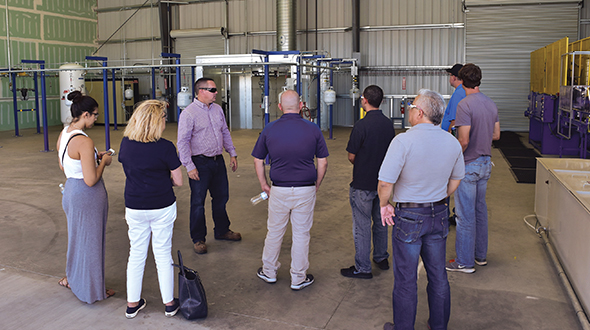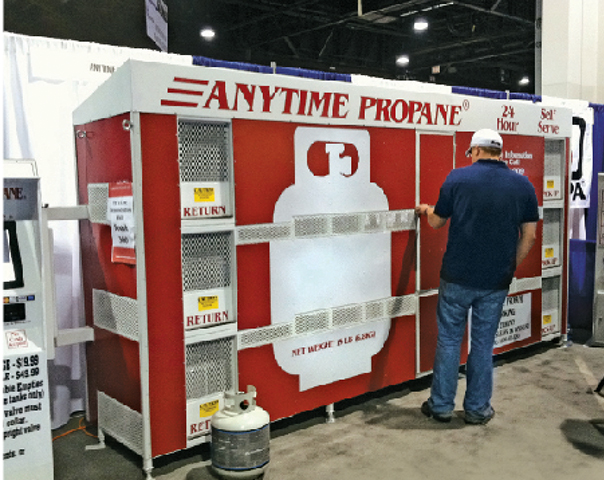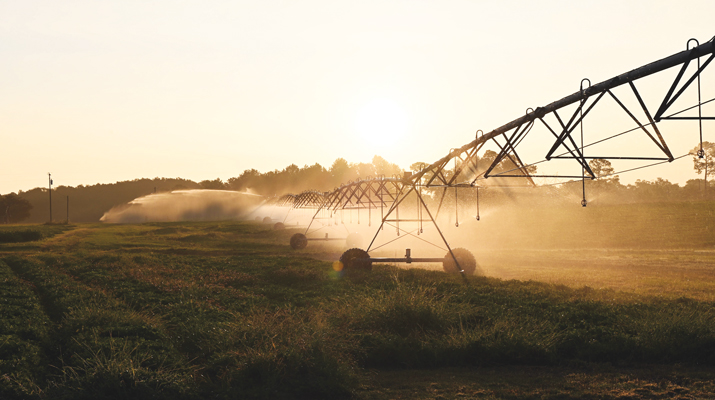Automation adds efficiency to cylinder exchange market

Pick Up Propane manager Chad Richardson leads a tour for visitors at the Jurupa Valley production center. Photo courtesy of Kamps Propane
A smorgasbord of technological innovations is cooking up increased efficiencies within the cylinder exchange filling and refurbishing marketplace, making the entire process quicker and easier for propane retailers, the canister-buying public and the store owners hosting the units in front of their businesses.
“There’s fixin’ to be a better way – and we’re proving it,” says Jim Clark, general manager at Anytime Propane, a provider of self-serve cylinder kiosks based in Chickasha, Oklahoma.
Fully automatic and semi-automatic cages are current additions to the company’s menu, and a third configuration under development will feature the ability to drive a pallet of cylinders directly into the apparatus.
“You’ll be able to service more stops” via the improvements being delivered, he says.
“We have utilized the latest technology available to combine automation and information to bring fast and convenient cylinder exchange to the consumer. The retailers love the marked increase in sales and savings on employee labor,” according to Clark.
And regarding propane marketers, “The dealers want real-time information and management capabilities, which allows them to run their business with nominal overhead, plan their routes and grow their business.”
Each sale is monitored to ensure that a customer never comes up empty when approaching for a purchase.
“They walk up to our machine, swipe their credit card, and in 30 seconds they’re in their car heading home,” says Clark. “You don’t have to wait a half-hour while they find someone in the store to come outside.”
The fill rate for the fully automated machine stocking 34 to 190 cylinders – best-suited for high-volume locations averaging 200 vends per month – is up to 40 times faster than competing units, Clark says. A fill rate approaching 20 times the speed of existing cages is presented by the semi-automatic device with an 18-cylinder capacity for sites experiencing about 50 monthly sales.
Improving on performance

Anytime Propane specializes in self-serve cylinder kiosks. Photo by Brian Richesson
Serving cylinder exchanges throughout California and four other states, Pick Up Propane – a division of Kamps Propane – recently constructed a new state-of-the-art filling system in Jurupa Valley, California, that relies on automation to increase productivity and quality, joining an original facility located in Manteca, California.
“It’s mainly in-house, but we can fill cylinders for our competitors,” says company President Terry Ayers.
“The market demand for propane tank exchange is tremendous,” notes John Kamps, the firm’s founder. “We invested in this new facility to demonstrate leadership to our customers because they need a reliable supplier who can help them maintain inventory.”
Exchanged cylinders must be inspected, washed or painted and then carefully refilled before they are sleeved with a plastic cover and placed back into the cage.
The new process is dramatically increasing production without requiring additional employees.
“It has an automated carousel, and they fill automatically,” says Ayers.
Computers and sensors precisely monitor and regulate production. Each step of the process is connected so that a tank can enter the system dirty and empty and then emerge clean, refilled and ready for delivery.
Keeping costs competitive
In April, New York-based Paraco Gas inaugurated a centralized in-house cylinder refurbishing facility in Waterbury, Connecticut, that replaces four outsourced providers.
“Other than the loading and unloading of the tanks, it’s an automated system,” says Arthur Ravo, vice president of supply chain. “We put this site closer to our distribution points,” referring to the company’s 10 cylinder-servicing locations throughout the Northeast.
“We only do it for our own distribution plants, but we may look at offering these services to other cylinder exchange marketers. The exchange business continues to grow,” says Ravo, “but it’s getting a bit crowded now because it’s not new.”
In-season, during which 95 percent of the business involves fulfilling grilling needs, Paraco Gas’ cylinder division employs 20 people; 15 workers are on the job over the off-season, mostly serving contractors in need of portable heaters.
“We’re slated to do 1.3 million units per year utilizing just a single shift,” Ravo says about its new capabilities. “This was on the drawing board for a number of years until we got the approvals and permits.”
The facility allows the company to maintain control over product quality while keeping costs competitive within the market, positioning Paraco to further expand its cylinder exchange presence within the region.
“We wanted as safe a system as possible,” adds Ravo, referring to the trained staffers who eliminate the riskier method of customer-centric, on-site tank filling.
















